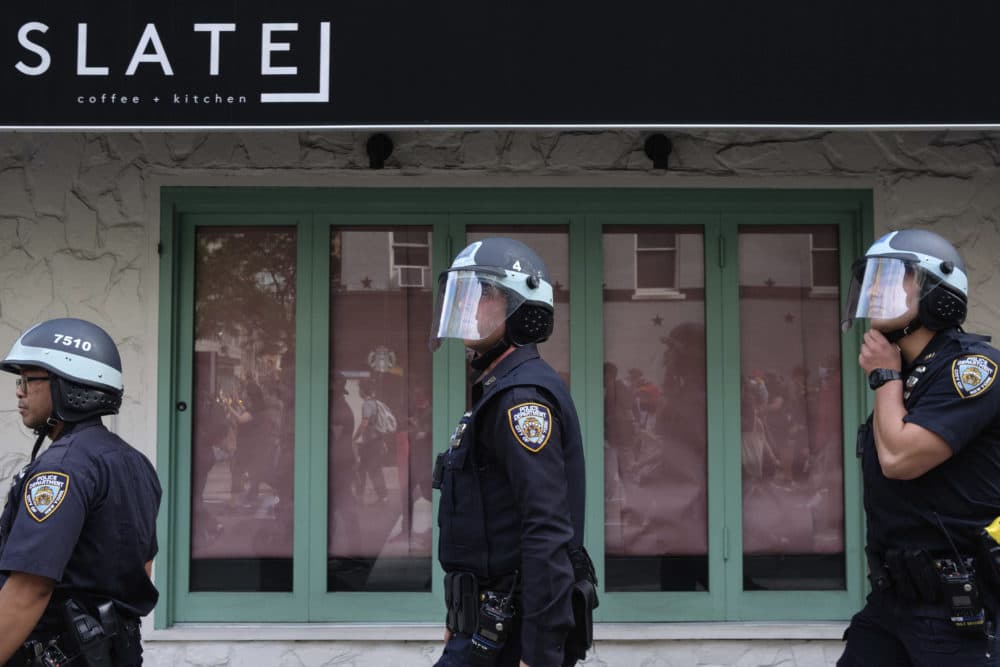Advertisement
Commentary
How Should We Reform The Police? Get Bad Cops Off The Street

Protesters in the streets are calling for police reform, but what exactly should reform look like?
Congressional Democrats in Washington took a knee Monday, pushing for sweeping police reform legislation. This is part of a wave of those in power who have joined protesters' calls for concrete change. On Wednesday, President Barack Obama urged police departments to review "use of force" policies. Thursday, former Boston Police Department Commissioner Ed Davis called on police unions to stop protecting bad cops. On Friday, Minneapolis moved to ban chokeholds.
A specific ban on chokeholds, and reform of an arbitration system that keeps troubled officers on the force, have moved to center stage.
Fully 72% of disciplinary actions taken against Boston Police officers are overturned in arbitration ...
What happened to George Floyd at the hands of Minneapolis police is far from unique. In Boston, Officer David C. Williams made headlines after he was fired two times, and twice was reinstated after arbitration. The first time, in 1995, Williams nearly killed an undercover police officer, Michael Cox, mistaking him for a criminal. Williams' firing was overturned in arbitration. Then, in 2009, Williams was accused of using excessive force after putting a chokehold on a man, Michael O'Brien, during an arrest in Boston's North End. That case resulted in the City of Boston settling with O'Brien for $1.4 million. Again, Williams was fired but reinstated after arbitration.
Fully 72% of disciplinary actions taken against Boston Police officers are overturned in arbitration, according to a 2016 report by WCVB reporter Mike Beaudet, whose students at Northeastern University's School of Journalism helped compile the figures. (Full disclosure: My husband, Jonathan Kaufman, is director of Northeastern's School of Journalism.)
Keeping rogue officers on the force through an arbitration process is baked into the union contract. This is not unique to Boston. According to the University of Pennsylvania Law Review, "In recent years ... a troubling pattern has emerged. Because of internal appeals procedures, police departments must often rehire or significantly reduce disciplinary sanctions against officers who have engaged in serious misconduct."
"If someone isn't fit to be an officer, I should have the right to get rid of him."
Former Boston Police Commissioner Bill Evans
"If someone isn't fit to be an officer, I should have the right to get rid of him," then-Boston Police Commissioner Bill Evans told me as I anchored WGBH's All Things Considered in March of 2017, as the Williams case was pending before the Massachusetts Supreme Judicial Court. "It's troubling when an arbitrator doesn't stand behind me when we have grounds for termination."
Four months later, in July of 2017, the SJC ruled on the Williams case, effectively noting that its hands were tied because the Boston Police Department does not have rules explicitly forbidding chokeholds. In writing the opinion, Justice Geraldine Hines said, "the Court is troubled by the prospect that any use of force not explicitly prohibited by a rule of conduct is essentially unreviewable." The court ordered Officer Williams reinstated.
When the current BPD Commissioner William Gross said this past week that the department is "on the road to change", he did not lay out specifics. Perhaps things are moving ahead behind closed doors. Meanwhile, Minneapolis has moved to ban chokeholds. Will Boston follow suit? Will Boston address an arbitration system that keeps troubling officers on the force?
Advertisement
The reform legislation being pushed by Congressional Democrats in Washington is unlikely to clear the U.S. Senate, but protesters' demand for accountability is gaining momentum. Boston — and Beacon Hill — are in a stronger position than ever to make long sought-after changes through policy and legislation to put an end to mechanisms underpinning systems that keep bad cops on the street.
